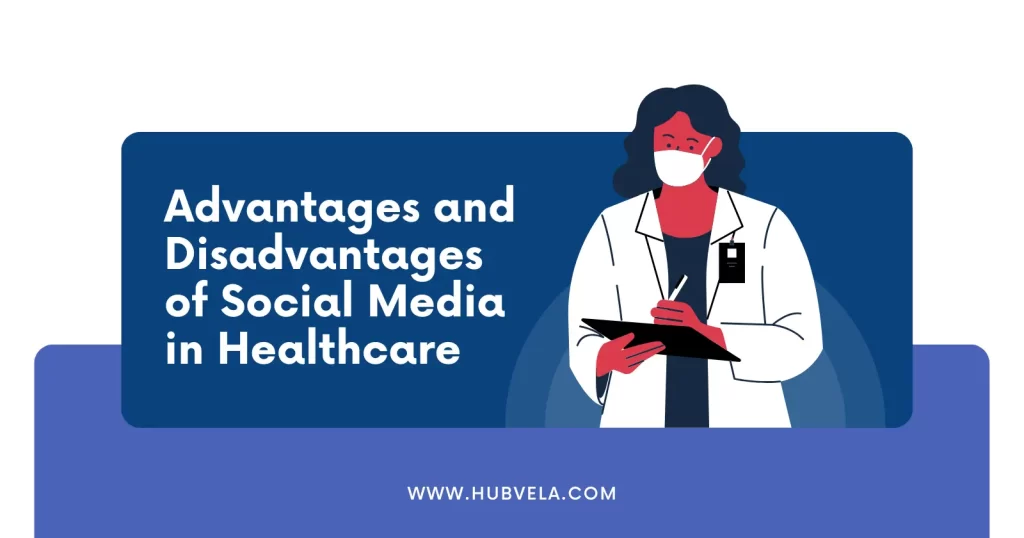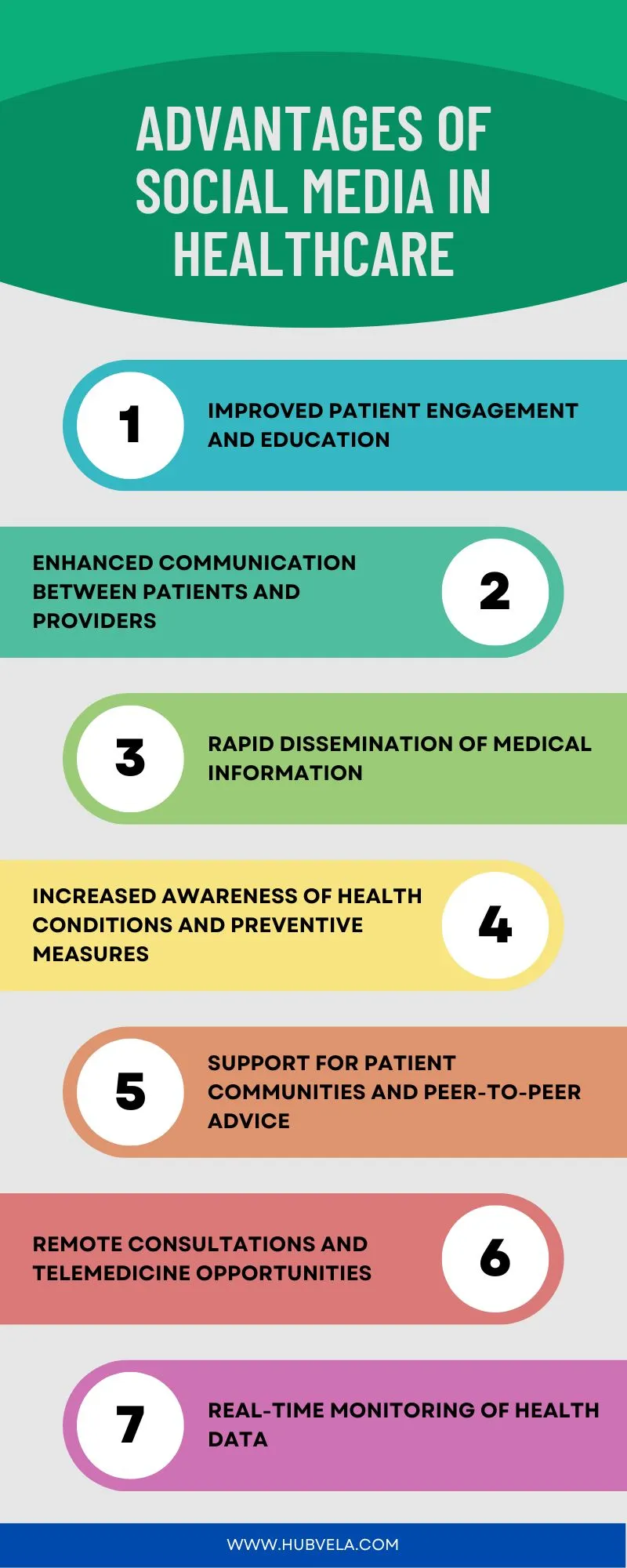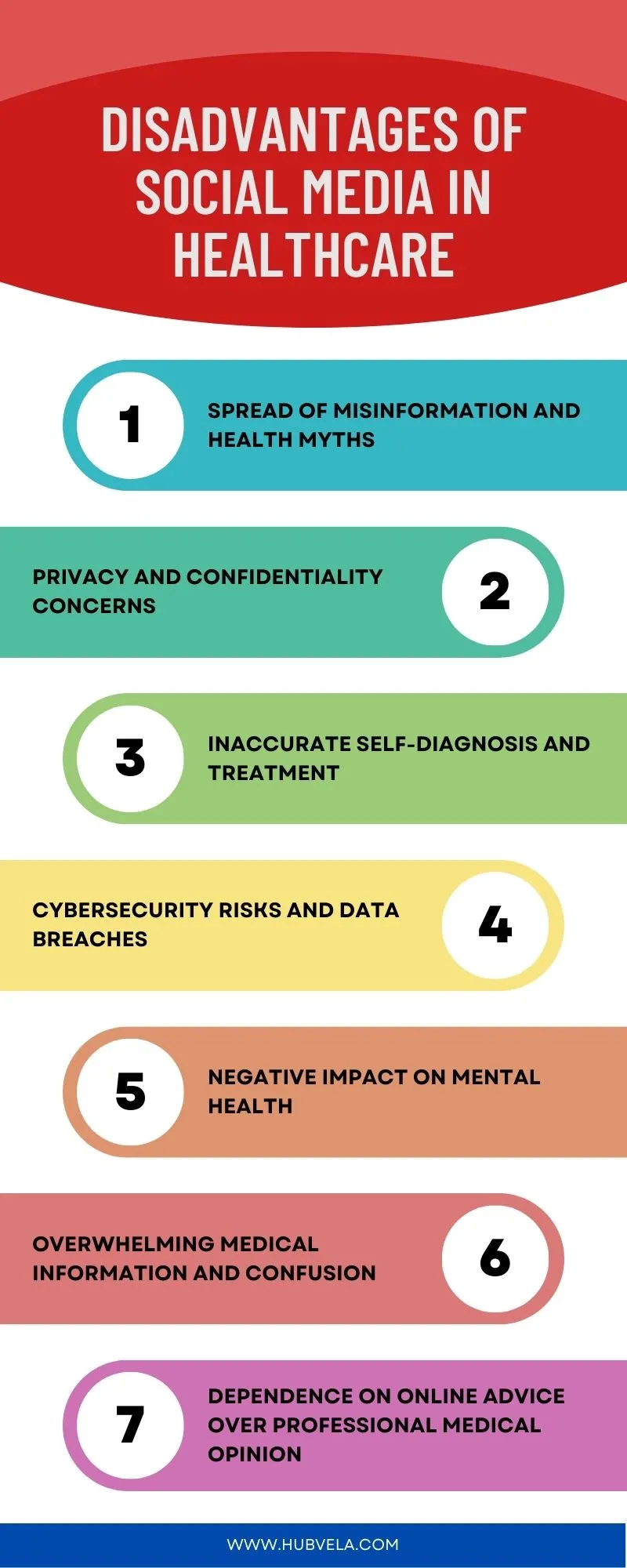Social media has become an integral part of our daily lives, and the healthcare industry is no exception. Healthcare organizations are utilizing social media in a variety of ways to communicate with patients, promote healthy living initiatives, and increase brand trust.
Social media provides healthcare professionals with applications to share health information, debate health practice issues, and communicate with the public. However, there are both advantages and disadvantages to using social media in healthcare.
In this article, we will explore the advantages and disadvantages of social media in healthcare, and discuss best practices to help healthcare organizations make informed decisions about their social media presence.

--Advertisement--
Advantages of Social Media in Healthcare
Social media has become an integral part of our lives, and its impact on healthcare is undeniable. The integration of social media into numerous aspects of healthcare has helped healthcare organizations modernize their approach to a wide range of functions.
Social media provides healthcare professionals with tools to share information, debate healthcare policy and practice issues, promote health behaviors, engage with the public, widen their reach, and expand their practice as healthcare practitioners.
We will discuss the advantages of social media in healthcare and how it can be used to improve patient care and outcomes.

1. Improved Patient Engagement and Education
Social media platforms have revolutionized the way healthcare providers engage with patients and educate them about various health topics.
Through social media, healthcare organizations can reach a wider audience and provide valuable information in an easily accessible format. Patients can actively engage with healthcare professionals, ask questions, and receive timely responses.
This interactive nature of social media promotes a sense of empowerment and involvement in their own healthcare journey.
Additionally, social media allows for the dissemination of accurate and reliable health information, debunking myths and misconceptions that may be circulating. Patients can access educational resources, articles, and videos that help them understand their conditions, treatment options, and preventive measures.
Social media has greatly enhanced patient engagement and education, empowering individuals to make informed decisions about their health.
2. Enhanced Communication Between Patients and Providers
Social media has transformed the way healthcare providers communicate with their patients. Patients can now easily connect with their healthcare providers through social media platforms, such as Twitter, Facebook, and Instagram.
These platforms provide a direct line of communication between patients and providers, allowing for timely responses to questions and concerns.
Social media also enables healthcare providers to share important health information with their patients, such as updates on new treatments and procedures.
Patients can also provide feedback on their experiences with healthcare providers, which can help improve the quality of care. Additionally, social media can be used to coordinate care between multiple providers, ensuring that patients receive the best possible care.
Social media has greatly enhanced communication between patients and providers, leading to better health outcomes and improved patient satisfaction.
3. Rapid Dissemination of Medical Information
One of the significant advantages of social media in healthcare is its ability to rapidly disseminate medical information.
Social media platforms provide a quick and efficient way for healthcare organizations, professionals, and researchers to share important updates, research findings, and health-related news with a wide audience.
This is particularly crucial during public health emergencies, where timely and accurate information is essential.
By leveraging social media, healthcare providers can reach a large number of people and ensure that important medical information reaches those who need it most.
Additionally, social media allows for the sharing of information in various formats, such as articles, videos, and infographics, making it more accessible and engaging for the audience.
This rapid dissemination of medical information through social media helps to keep patients and the general public informed, educated, and empowered to make informed decisions about their health.
4. Increased Awareness of Health Conditions and Preventive Measures
Social media has become a powerful tool for promoting awareness of various health conditions and preventive measures.
Healthcare organizations and professionals can use social media platforms to share information about health conditions, symptoms, and treatment options.
They can also provide tips on preventive measures, such as healthy lifestyle choices and vaccination schedules.
Social media can also be used to raise awareness about public health issues, such as epidemics and pandemics, and to disseminate information about preventive measures and treatment options.
By leveraging social media, healthcare providers can reach a wider audience and promote health literacy, empowering individuals to take charge of their health and make informed decisions.
Social media has greatly increased awareness of health conditions and preventive measures, leading to better health outcomes and improved quality of life.
5. Support for Patient Communities and Peer-to-Peer Advice
Social media has become a valuable tool for patients to connect with others who share similar health conditions and experiences.
Through social media platforms, patients can join virtual communities, participate in research, receive financial or moral support, set goals, and track personal progress.
These online communities provide a safe space for patients to share their stories, ask questions, and receive advice from others who have gone through similar experiences.
Patients can also receive peer-to-peer advice on various health-related topics, such as treatment options, medication side effects, and coping strategies.
Social media has also enabled healthcare providers to engage with patient communities, providing valuable insights and support.
Social media has greatly enhanced patient support and empowerment, providing a platform for patients to connect with others, share their experiences, and receive valuable advice and support.
6. Remote Consultations and Telemedicine Opportunities
Social media has played a significant role in the growth of telemedicine and remote consultations. Telemedicine enables healthcare providers to deliver health services to patients at remote locations, by conducting “virtual visits” via videoconference or phone.
During the COVID-19 pandemic, telemedicine has become an essential tool for healthcare providers to provide care while respecting social distancing.
Patients can interact with providers from their usual source of care or stand-alone telemedicine platforms like Amwell or Virtuwell.
Telemedicine can address non-urgent care or routine management of medical or psychiatric conditions, while online or app-based questionnaires can facilitate COVID-19 screening to determine the need for in-person care.
Social media has also enabled healthcare providers to promote telemedicine services and educate patients about the benefits of remote consultations.
Social media has greatly enhanced the accessibility of healthcare services, enabling patients to receive care from the comfort of their homes.
7. Real-Time Monitoring of Health Data
Social media has the potential to enable real-time monitoring of health data, allowing healthcare providers to track patient health and intervene when necessary.
Patients can use social media platforms to share their health data, such as blood pressure readings, glucose levels, and physical activity, with their healthcare providers.
This data can be used to monitor patients’ health status and identify potential health issues before they become serious.
Social media can also be used to monitor public health trends, such as disease outbreaks and epidemics, by tracking social media conversations and identifying patterns.
This real-time monitoring of health data can help healthcare providers to provide more personalized care and improve health outcomes.
However, there are also concerns about the privacy and security of health data shared on social media, which need to be addressed to ensure patient confidentiality and trust.
Social media has the potential to enable real-time monitoring of health data, leading to more personalized and effective healthcare.
Disadvantages of Social Media in Healthcare
Social media has become an integral part of our daily lives, and its impact on healthcare is undeniable. Healthcare providers and organizations are increasingly using social media to connect with patients, share information, and promote their services.
However, there are also several disadvantages of social media in healthcare that need to be considered. We will explore the drawbacks of social media in healthcare and how it can affect patients and healthcare professionals.

1. Spread of Misinformation and Health Myths
The spread of misinformation and health myths is a significant concern when it comes to social media’s impact on healthcare.
With the ease of sharing information on platforms like Facebook and Twitter, false or misleading health information can quickly go viral and reach a wide audience.
This can lead to individuals making uninformed decisions about their health, following ineffective or even dangerous treatments, and disregarding evidence-based medical advice.
The lack of regulation and fact-checking on social media platforms makes it challenging to control the spread of misinformation, and it can have serious consequences for public health.
It is crucial for healthcare professionals and organizations to actively combat misinformation by providing accurate and reliable information, engaging with the public, and promoting critical thinking skills when it comes to health-related content on social media.
2. Privacy and Confidentiality Concerns
The use of social media in healthcare raises concerns about privacy and confidentiality. Patient privacy is one of the most significant concerns related to social media use in healthcare.
Maintaining the privacy of patients’ protected health information (PHI) is critical, and it is addressed in federal law and governed by the U.S.
Department of Health and Human Services (HHS) under the Health Insurance Portability and Accountability Act of 1996 (HIPAA).
The boundaries between appropriate versus inappropriate and personal versus professional social media use can easily blur, making it challenging to manage privacy risks.
Healthcare workers have posted pictures of, or confidential information about, patients on professional or personal social media pages without the patient’s consent, which violates confidentiality and the patient’s privacy rights.
Social media can easily violate legal and ethical confidentiality standards, even though it is a valuable tool for treatment, patient education, and marketing.
3. Inaccurate Self-Diagnosis and Treatment
Inaccurate self-diagnosis and treatment a significant disadvantages of social media in healthcare.
With the abundance of health-related information available on social media platforms, individuals may be tempted to self-diagnose and treat themselves based on what they read online.
However, this can be dangerous, as the information may be inaccurate or misleading. In some cases, individuals may even delay seeking professional medical help, which can lead to serious health complications.
It is important for individuals to consult with a healthcare professional before making any decisions about their health, and to be cautious about the information they read on social media.
Healthcare professionals also have a responsibility to educate their patients about the risks of inaccurate self-diagnosis and treatment and to encourage them to seek professional medical help when necessary.
4. Cybersecurity Risks and Data Breaches
While social media has many advantages in healthcare, it also poses significant cybersecurity risks and data breaches.
Healthcare organizations are particularly vulnerable to cyberattacks because they possess a lot of sensitive information that is of high monetary and intelligence value.
Cyberattacks on electronic health records and other systems pose a risk to patient privacy because hackers can access personal health information (PHI) and other sensitive information.
By failing to keep patient records private, healthcare organizations could face substantial penalties under HIPAA’s Privacy and Security Rules, as well as potential harm to their reputation within the community.
Most importantly, patient safety and care delivery may also be jeopardized. Losing access to medical records and lifesaving medical devices, such as when a ransomware virus holds them, hostage, will deter the ability to effectively care for patients.
Cybersecurity risks have increased during the COVID-19 pandemic, with a rise in phishing, ransomware, and distributed denial-of-service (DDoS) attacks.
Healthcare organizations need to take proactive measures to protect patient safety and privacy, such as implementing robust cybersecurity measures, providing staff training, and conducting regular risk assessments.
5. Negative Impact on Mental Health
Social media has been linked to negative impacts on mental health, including depression, anxiety, loneliness, and self-harm. Studies have found that heavy social media use can increase the risk of these mental health issues.
Social media use can also lead to decreased, disrupted, and delayed sleep, which is associated with depression, memory loss, and poor academic performance.
Researchers have found that social media use can affect users’ physical health even more directly, as the connection between the mind and the gut can turn anxiety and depression into nausea, headaches, muscle tension, and tremors.
Indicators that social media may be adversely affecting mental health include worsening symptoms of anxiety or depression.
Therefore, it is important to use social media in a healthy way and to reassess social media habits if they are causing negative impacts on mental health.
6. Overwhelming Medical Information and Confusion
The overwhelming amount of medical information and confusion caused by social media is a significant disadvantage in healthcare. While social media can be a source of health information, the accuracy and reliability of this information are often questionable.
A study conducted by PlushCare found that 84% of mental health videos on TikTok were misleading. This misinformation can lead to confusion among patients, who may struggle to differentiate between accurate and inaccurate information.
As a result, healthcare providers are often tasked with unraveling the patient’s history and understanding their symptoms, which can be time-consuming and create an additional burden for frontline providers.
Furthermore, patients may become overwhelmed by the sheer volume of information available on social media, leading to confusion and anxiety.
The overwhelming medical information and confusion caused by social media can have negative consequences for patients and healthcare providers alike.
7. Dependence on Online Advice over Professional Medical Opinion
One of the major disadvantages of social media in healthcare is the growing trend of people relying on online advice rather than seeking professional medical opinions.
With the abundance of information available on the internet, it has become easy for individuals to search for symptoms, self-diagnose, and even find remedies or treatments without consulting a healthcare professional.
While the accessibility of information can be beneficial in some cases, it can also lead to misinformation, misdiagnosis, and potentially harmful self-treatment.
Online platforms lack the expertise and personalized care that healthcare professionals provide, and relying solely on online advice can delay proper diagnosis and treatment.
It is important to remember that healthcare professionals undergo years of education and training to provide accurate and reliable medical advice, and their expertise should not be replaced by online sources.
Conclusion on Advantages and Disadvantages of Social Media in Healthcare
In conclusion, social media has both advantages and disadvantages in healthcare. On the one hand, social media has revolutionized the way healthcare providers engage with patients and educate them about various health topics.
It has enhanced patient engagement and education, improved communication between patients and providers, increased awareness of health conditions and preventive measures, enabled remote consultations and telemedicine opportunities, and facilitated real-time monitoring of health data.
On the other hand, social media poses significant cybersecurity risks and data breaches, which can compromise patient privacy and safety.
Healthcare organizations need to take proactive measures to protect patient safety and privacy, such as implementing robust cybersecurity measures, providing staff training, and conducting regular risk assessments.
Overall, social media has the potential to transform healthcare, but it is essential to balance the benefits with the risks and challenges.


